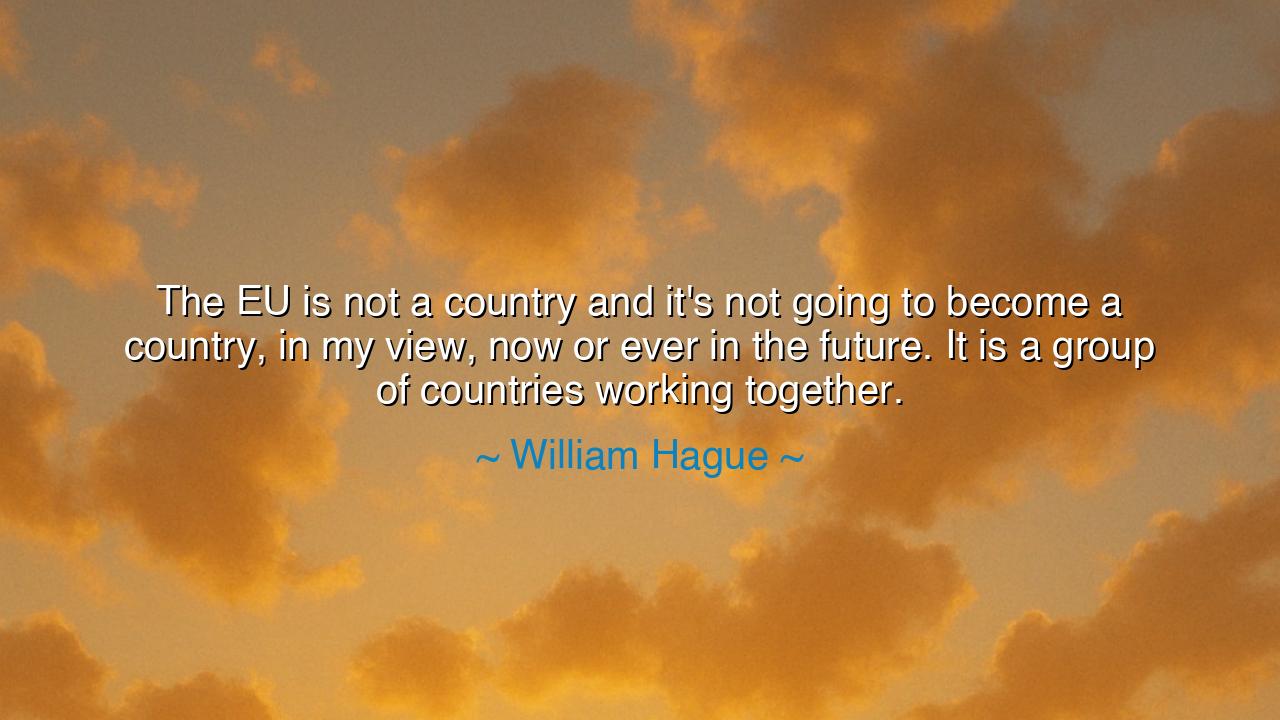
The EU is not a country and it's not going to become a country
The EU is not a country and it's not going to become a country, in my view, now or ever in the future. It is a group of countries working together.






William Hague’s words, “The EU is not a country and it’s not going to become a country, in my view, now or ever in the future. It is a group of countries working together,” strike at the heart of a debate that has raged for centuries—unity versus sovereignty. In this statement, Hague draws a clear line between the idea of a unified political entity and the sovereignty of individual nations. He speaks to a truth that resonates deeply with the wisdom of the ancients, who understood the balance between the strength that comes from unity and the freedom that is found in independence. The European Union, in Hague’s eyes, is not a single nation, but rather a league of sovereign states, each with its own identity, yet bound together by shared interests.
The concept of unity in the face of diversity is not new. The ancient Greeks understood this well, especially in their vision of the Delian League—a coalition of city-states that, while united for mutual defense, maintained their individual autonomy. In the same vein, the European Union represents a modern attempt to balance the unity required for economic cooperation and security with the sovereignty of nations that hold dear their distinct identities, traditions, and values. Hague’s words are a reminder that, while cooperation can create strength, it does not require the erasure of each member’s independence. Instead, it celebrates the strength of individuals coming together for a common cause while still respecting their sovereign boundaries.
The wisdom of the Romans also provides insight into Hague’s perspective. The Romans built an empire that stretched across vast lands, but even within this empire, they recognized the importance of maintaining local customs and governance. Through the Roman confederation system, they allowed different peoples to maintain a degree of autonomy while benefiting from the collective strength of the empire. This balance between local governance and centralized authority is a principle that resonates with Hague’s vision of the EU: a collection of nations working together, but not bound by the imperative to become one monolithic state. The Roman legacy reminds us that unity can exist without the need to erase individual identities.
In more recent history, we see similar debates around the balance of power. The formation of the United States provides an example of a country forged from diverse states, each with its own sovereign interests, but united under a common constitution. This federation allowed the individual states to maintain their own identities while benefiting from the strength of a united nation. Yet, even within such a union, the question of how much centralized power should be exercised over the states has been a constant source of tension. Hague’s words reflect a similar tension in the European context: unity must be achieved without undermining the sovereignty of the individual nations that make up the EU.
Hague’s statement also underscores a key point: the EU is not a monolithic entity seeking to dominate or replace the individual identities of its member states. It is, rather, a union that recognizes the diversity of nations while seeking common ground on matters of trade, security, and cooperation. The European Union, like the Roman Empire, is built on the understanding that strength arises from the ability to cooperate without demanding the conformity of each member. It is an expression of unity in diversity, a notion that ancient civilizations understood well and one that continues to define the dynamics of modern geopolitics.
In the modern world, where globalization challenges traditional notions of sovereignty, Hague’s words are a call to honor the individuality of nations while still fostering collaboration. The challenge before us is not to erase borders or undermine national identities, but to find ways to work together for the common good. As the ancients taught, the path to strength lies not in the obliteration of differences, but in the celebration of them, and in the recognition that we are stronger when we respect one another’s sovereignty while cooperating on shared goals.
Lesson for the ages:
True strength is not born of uniformity, but of unity in diversity. The great empires and unions of history have thrived not by erasing the individual identities of their people, but by embracing them, understanding that cooperation does not require conformity. Whether in ancient Greece, Rome, or modern Europe, the greatest societies have understood that sovereignty and unity can coexist, and that working together for the common good is the path to lasting prosperity and peace.
Practical Action:
As you navigate your own life and the challenges of living in an increasingly globalized world, remember the lessons of sovereignty and cooperation. Celebrate the diversity of individuals and communities, while seeking common ground on shared goals. Just as nations can work together to achieve greater strength, so can you, in your own life, collaborate with others while still honoring the uniqueness of each person. In your career, your community, and your relationships, seek to build bridges, embrace differences, and find strength in unity without compromising the individuality that makes us who we are.






AAdministratorAdministrator
Welcome, honored guests. Please leave a comment, we will respond soon